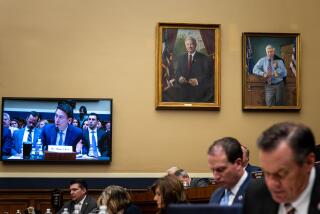Bush Is Dogged by ‘Axis of Evil’ in Visit to Japan
- Share via
TOKYO — President Bush may be on a swing through Asia, but the issue that is increasingly shaping his visit, in public anyway, is the “axis of evil.”
Editorials are warning about the dangerous implications for the world of the president’s characterization of Iraq, Iran and North Korea. Demonstrators are protesting the possibility of a new U.S. military campaign. And both Bush and his senior staff are increasingly on the defensive as they are deluged with questions about the administration’s plans for dealing with the three countries.
“We want to resolve all issues peacefully, whether it be Iraq, Iran or North Korea,” the president said Monday when pressed about his intentions by a Japanese reporter at a joint news conference with Prime Minister Junichiro Koizumi.
Afterward, Secretary of State Colin L. Powell hastened to tell reporters traveling with the president that America’s allies should not fear “a state of war tomorrow.” He added, “Let’s not swoon.”
The president’s six-day tour was designed to boost relations with the three countries most critical to long-term U.S. interests in the Asia-Pacific region: Japan, South Korea and China. Yet in an editorial, the Japanese daily Asahi Shimbun charged that Bush’s comments have increased regional tensions and displayed a complete disregard for local sensitivities, while the Okinawa Times said the U.S. is following a misguided law-of-the-jungle approach.
“America’s aggressive threats, instead of reducing North Korea’s isolation, threaten to further isolate that country and spur instability,” the Okinawa paper said. “If America takes the military steps it’s threatened, there’s no logical basis to its war on terror.”
Student, labor and civic group protesters voiced their own disapproval of the Bush comments Monday in a series of modest demonstrations in Tokyo, Hiroshima and Osaka.
In one display, a band from the civic group Peace Boat danced in Tokyo’s crowded Shinjuku district sporting banners that read, “Who’s the Real Axis of Evil?” beside a cartoon of the president.
“Bush is evil axis No. 1,” said Peace Boat spokeswoman Hanna Jongepier.
And Japan is likely to be the most receptive of the three nations Bush will visit.
Despite his attempt Monday to reassure America’s allies, Bush continued to hammer away at the theme of the United States’ intent to deal with the “axis” countries.
“There should be no mistake about it. We will defend our interests,” he said at the news conference.
When pressed on whether the U.S. would go it alone if coalition partners balked, Bush replied, “We cannot allow nations that aren’t transparent, nations with a terrible history, nations that are so dictatorial they’re willing to starve their people, to mate up with terrorist organizations.”
World leaders he’s talked to “fully understand, exactly, what needs to happen,” the president added.
Koizumi expressed strong support for the U.S.-led fight against terrorism. But there are growing signs that the public in Japan, the closest U.S. ally in Asia, is wary of what looks to be the next phase of the campaign--which could in turn influence the government’s position.
For many Japanese, Bush’s good-versus-evil language is unsettling on less concrete grounds, as the product of a world view that sees black and white but doesn’t always seem to appreciate the area in between where most people live.
“It underscores the rather childish U.S. diplomacy,” said Kazuto Suzuki, a professor at the University of Tsukuba. “He’s thrown up a stereotype, but there’s no hard evidence behind his charges.”
Military issues also remain controversial in a nation with a constitution that bans the use of force in settling disputes. In addition, Japanese are concerned about the costs at a time when their debt-laden nation faces both mounting budget problems and the threat of a banking meltdown.
“Japan wants to know how much it will need to contribute to future international efforts,” said Tetsuo Maeda, a defense expert at Tokyo International University. “We’re already at the limit of what we can do financially and politically.”
Many Japanese also fear the repercussions of any campaign against Iran or Iraq--countries from which Japan buys oil--or North Korea. In the Mideast, the fallout could be substantial for an energy-dependent nation.
“Other Middle Eastern nations would react negatively to any attack, so any move by Japan in support of a U.S. campaign could spell trouble for Japanese energy security,” said Isamu Nakashima, a researcher at the Middle East Institute of Japan.
Japan is home to about 1.7 million residents of Korean descent. North Asians, in addition, prefer accommodation over confrontation.
“If the U.S. pushes too hard, it could backfire,” said Ken Takada, a representative of the Coalition Against Constitutional Reform, a Tokyo-based civic group.
Bush’s comments have already angered many second- and third-generation Koreans living in Japan’s second-largest city, said Tokuo Baba, a representative of the Osaka Municipal Labor Union.
“They completely undermine efforts to work toward peace on the Korean peninsula,” he said.
Koizumi and Bush tried to make light of the “evil axis” questions.
“This is the arrow to beat the evil and bring you everlasting peace,” Koizumi said before presenting Bush with a print of a samurai rider--whose face resembled the president’s--shooting a bow and arrow.
More to Read
Sign up for Essential California
The most important California stories and recommendations in your inbox every morning.
You may occasionally receive promotional content from the Los Angeles Times.













